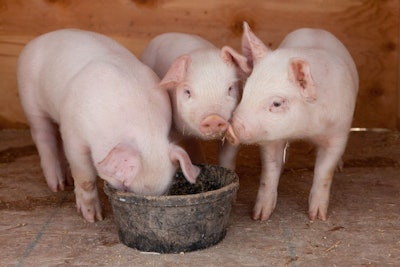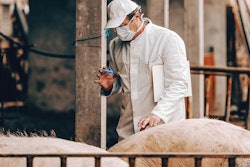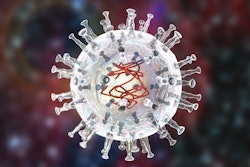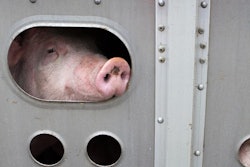
Study finds plant-only diet impairs pigs’ recovery from Salmonella even with added amino acids
Pigs fed a plant-only diet may suffer greater effects and longer recovery times when stricken with diseases — even when those pigs receive functional amino acids intended to boost immune performance, according to new research from the University of Saskatchewan.
In the study, nursery pigs received one of two diets — one with proteins sourced from plants, and another with animal-based proteins. Some of the pigs on either diet also received a functional amino acid supplement comprised of methionine, threonine and tryptophan. Although the supplement helped to mitigate some of the effects of infection with Salmonella, to which the pigs were intentionally exposed, those fed the plant-only diet required a longer recovery period and suffered greater performance losses. The supplement did not appear to have any effect on the pigs fed a diet with animal proteins, according to Dan Columbus, a research scientist at the University of Saskatchewan.
“All the diets, whether or not they had the supplemental amino acids, all contain the same amino acid content,” Columbus said. “They all should have met the requirement. So why do animal-based diets perform that much better?”
The new study was a follow-up to research completed in 2014, Columbus said. At the time, plant-based nursery diets were of interest because of the potential cost savings, and because there is a social movement calling for the exclusion of animal-based proteins from farm animal diets. And the results were generally positive — pigs reared on either diet showed no difference in performance.
There was just one hiccup, Columbus said: When some of the pigs in the initial research became unexpectedly ill, the pigs fed the plant-based diets didn’t do as well and took longer to recover. Although this caught scientists’ attention, Columbus said they didn’t have time to follow up on the finding until recently.
The supplemental amino acids provided in the follow-up study certainly helped to mitigate the effects of the plant-only diets, but don’t appear to tell the whole story since the plant-fed pigs that received the supplements still did not perform as well as the pigs fed animal-based proteins. While it remains unclear why this is the case, Columbus said it could be there are other factors associated with animal-based proteins that explain the difference.
“In animal-based ingredients, you potentially have other bioactive compounds [not present] in plant-based” diets,” Columbus said. “One of the things we included was bloodmeal, which we know might contain immunoglobulins.”
This doesn’t mean producers should swear off plant-only diets for their animals, Columbus said, but those who choose to cater to this market segment may want to consider more stringent biosecurity to limit their herds’ exposure to pathogens.















